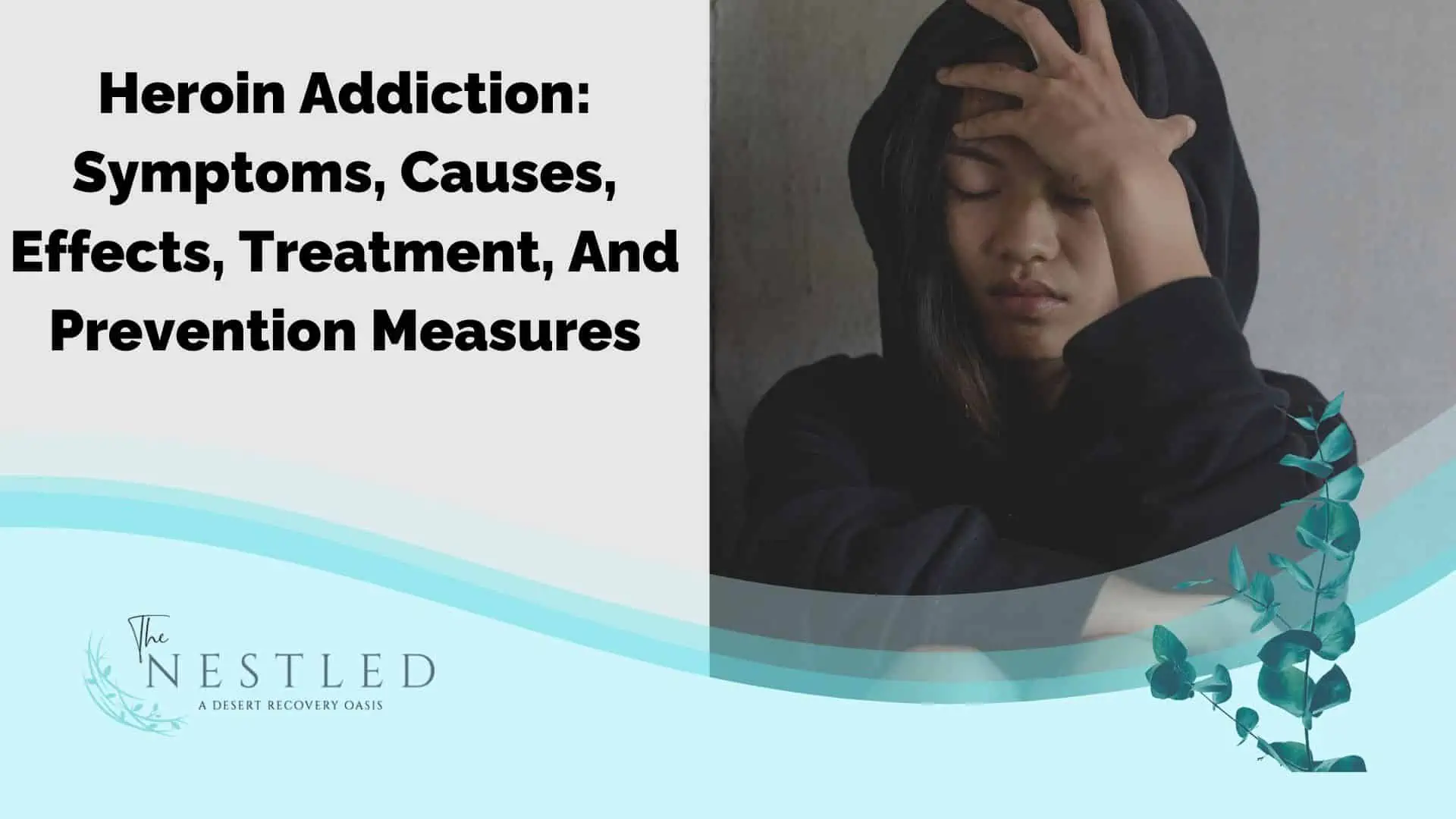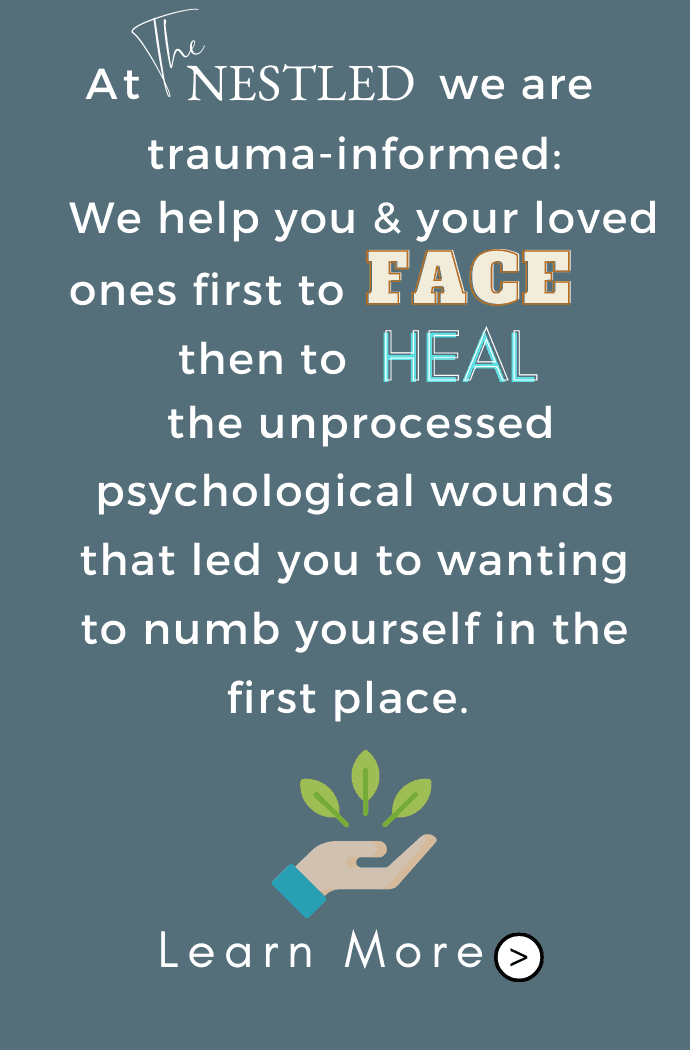Heroin addiction is the compulsive use of the drug heroin repeatedly without control despite the horrible mental and physical effects on its users. Heroin is a highly addictive drug with effects such as euphoria and pain relief, leading to dependency and addiction characterized by uncontrollable drug-seeking behaviors.
Symptoms of heroin addiction include isolation, hyperactivity, needle marks, cognitive impairment, increased sleep, paranoia, and poor hygiene.
Heroin addiction is caused by several factors, including genetic predisposition, untreated mental health illness, and exposure to the drug.
Effects of heroin addiction range from immediate effects like dry mouth, extremely heavy sensations, nausea, itching, and warm flush skin to longer-term effects. Longer-term effects of heroin include liver and kidney failure, pneumonia, skin infection, and a higher risk of hepatitis and HIV aids.
Recovery from heroin addiction involves medically supervised detox, long-term behavioral therapies, medication-assisted treatment, and support systems to manage withdrawal symptoms and prevent relapse.
What Is Heroin?
Heroin, a potent and illegal drug, is derived from morphine, extracted from the opium poppy plant. This white or brown powder is the typical form sold, as well as a stickier black tar heroin. Upon entering the brain, heroin is converted back into morphine, binding to mu-opioid receptors and triggering a euphoric sensation and pain relief. This powerful impact on the brain’s reward system is part of what makes it a highly addictive substance.
Users often snort or inject heroin, seeking a faster and more intense high. This rapid delivery into the brain not only intensifies the ‘rush’ but also increases the potential for dependency and addiction. The immediate effects of heroin use can include:
- Profound relaxation
- Inability to think clearly
- Fluctuating levels of consciousness
- Unconsciousness
The extent of these effects depends on several factors, including the dose, the user’s overall health, and whether other drugs or substances are in the user’s system.
What Is Heroin Addiction?
Heroin addiction is characterized by an intense and uncontrollable urge to consume heroin, not minding the negative effects it has on the user’s health and lifestyle. The highly addictive nature or intense cravings of heroin is the hallmark of its addiction and often results in a vicious cycle of heroin abuse, withdrawal, and relapse.
Heroin addicts have a hard time letting go of the habit because of its high chance of relapse. The use of heroin damages the part of the brain responsible for control, leading to an increased risk of heroin overdose.
According to the CDC Wonder Database 2021, approximately 9,173 people die from an overdose involving heroin addiction. The effects of heroin addiction is one with long arms and can reach everyone, even in their safest place.
What Is The Impact Of Heroin Addiction?
The impact of heroin addiction is the high increase of individuals struggling with heroin abuse. Despite its severe health risks, heroin use has been on the rise in recent years.
A 2021 survey conducted by the National Survey on Drug Use and Health shows that approximately 0.4% of Americans aged 12 and over reported heroin use within the past year, with a slight increase in heroin use among persons aged 18 and older from 0.2% in 2021 to 0.4% in 2022.
This upward trend is particularly noticeable among young adults aged 18-25, who have exhibited higher rates of drug use at 39%. These data demonstrate a pressing need for sustained prevention and treatment efforts, especially targeting heroin users.
Interestingly, the National Survey on Drug Abuse and Health on heroin abuse also shows a gender disparity. Men are more than twice as likely to use heroin, with a usage rate of 0.5% compared to 0.2% among women. This disparity underscores the complexity of the issue, as it suggests that different risk factors and societal pressures may influence men’s and women’s susceptibility to heroin addiction.
Out of all opioid abusers, 7.4% abuse heroin, and 4.0% use both heroin and prescription opioids, contributing to the broader opioid misuse problem. This interconnection between heroin and other opioids further emphasizes the need for comprehensive strategies to address the opioid crisis in its entirety.
What Causes Heroin Addiction?
Comprehending the roots of heroin dependency is instrumental in tackling this escalating problem. The following are some of the causes of heroin addiction:
- Genetic Predisposition
Genome-wide studies have identified genetic factors across multiple substance use addictions, indicating that hereditary factors significantly contribute to the risk of addiction, including heroin dependency.
In fact, research has found a number of genetic markers, such as single-nucleotide polymorphisms (SNPs), strongly associated with addiction risk. These markers are tied to the regulation of dopamine signaling, a key player in the brain’s reward system.
- Exposure To Heroin
Early initiation of illegal drug use substantially increases the likelihood of developing a substance addiction, including drug abuse. For instance, initiating illegal drug use before age 13 is a strong predictor of later heroin addiction. This fact underlines the necessity of prevention initiatives focused on children and adolescents, with the goal of postponing or completely avoiding the onset of drug use.
- Untreated Mental Illness
Another significant risk factor is untreated mental illness. Conditions such as ADHD, especially when combined with conduct disorders, pose a heightened risk for substance use disorders, suggesting the need for early intervention. This link between mental health and heroin addiction signifies an urgent requirement for combined care that simultaneously manages mental health disorders and substance use disorders.
What Are The Symptoms Of Heroin Addiction?
Identifying the symptoms of heroin addiction is vital for pinpointing individuals who need assistance. The following are some symptoms of heroin addiction;
Behavioral Signs Of Addiction
- Lying about drug use
- Avoiding loved ones
- Hyperactivity followed by exhaustion
- Increased sleeping
- Apathy
- Lack of motivation
- Inability to fulfill responsibilities
These behavioral symptoms may seem innocuous in isolation, but together, they paint a picture of a person struggling with addiction.
Cognitive Signs Of Heroin Addiction
- Disorientation
- Hallucinations
- Paranoia
- Neglect of personal hygiene
- Diminished clarity in thinking
These symptoms impact the addict’s ability to function in daily life, affecting relationships, work, and personal well-being.
Physical Signs Of Heroin Addiction
- Weight loss
- Skin picking which leads to scabs or bruises
- Possession of drug paraphernalia
- Respiratory infections
- Dry mouth
- Concealed track marks
- Constricted pupils
- Intense itching
- Nodding off mid-conversation
Awareness of these signs can assist in early detection of heroin use and timely intervention, potentially saving a life.
What Are The Effects Of Heroin Addiction?
The effects of heroin addiction are both short and long-term, meaning that an addict or heroin user will start to feel its effects immediately and over a long period of time. Here are some of the effects of heroin addiction;
Short-Term Effects Of Heroin Addiction
Short-term use of heroin leads to a ‘rush’ of euphoria, accompanied by:
- Warm flushing of the skin
- Dry mouth
- A heavy sensation in the extremities
- Potentially followed by symptoms like nausea, vomiting, and itching
Long-Term Effects Of Heroin Addiction
Brain impairment: Long-term use of heroin increases the chance of brain damage or impairment. Chronic heroin use increases the risk of neurobiological changes in the brain, leading to increased tolerance, physical dependence, and the development of addiction.
Hypoxia: As a central nervous system depressant, heroin increases the chances of hypoxia, a condition characterized by decreased breathing and limited oxygen to the brain, leading to both immediate and potential long-term brain damage.
Long-term heroin addiction increases the risk of severe health issues, including:
- liver and kidney disease
- skin infections
- chronic pneumonia
- collapsed veins
- increased risk of communicable diseases like HIV or Hepatitis B and C
These health risks, coupled with the potential for addiction and overdose, underscore the dire consequences of heroin abuse.
Signs Of Withdrawal From Heroin Addiction
The journey to recovery from heroin addiction is filled with challenges, and withdrawal is arguably one of the most difficult stages. Heroin withdrawal symptoms typically manifest within a few hours after the last dose is taken. Here are some of the immediate signs of heroin withdrawal:
- Chills
- Fever
- Sweating
- Nausea
Signs of heroin addiction withdrawal typically begin between 6 and 24 hours after discontinuing heroin use. Other signs of heroin withdrawal include:
- Intense cravings
- Extreme sweating
- Severe muscle aches and cramping
- Feelings of heaviness
- Insomnia
- Overwhelming sadness and depression
- Restlessness
- Anxiety
- Runny nose
- Sleep disturbances
- Diarrhea
- Persistent drug cravings
These symptoms typically peak after a few days and then gradually subside. It’s important to seek professional help and support during the withdrawal process.
The most critical period of heroin addiction withdrawal occurs within 24-36 hours after the last dose, intensifying the risk of relapse without professional medical assistance. This fact emphasizes the necessity of medical assistance for managing withdrawal since abruptly quitting can be perilous and frequently unsuccessful.
What Are The Signs Of Heroin Overdose?
One of the most immediate and lethal risks associated with heroin use is the threat of overdose. Heroin overdose can cause severe respiratory depression, leading to respiratory arrest, coma, and potentially death. Slowed breathing from heroin addiction potentially increases the chances of a coma and permanent brain damage.
Signs of a heroin overdose include:
- Unconsciousness
- Very small pupils
- Slow or shallow breathing
- Vomiting
- Inability to speak
- Faint heartbeat
- Limp arms and legs
- Pale skin
- Purple lips and fingernails
Recognizing these signs is often the difference between life and death. The risk of overdose increases when heroin is mixed with fentanyl, a synthetic opioid up to 100 times more potent than morphine.
In the event of an overdose, naloxone, a medication that rapidly reverses an opioid overdose, can be a lifesaving tool. Naloxone restores normal breathing to a person whose breathing has slowed or stopped due to an opioid overdose. However, it’s important to note that naloxone is not a substitute for immediate medical attention and constant monitoring.
What Are The Risk Factors Of Heroin Addiction
Lots of factors influence the tendency to get addicted to heroin. The following are some of the risk factors of heroin addiction;
- Mental Health Disorders
Co-occurring mental health disorders often complicate the journey to recovery for individuals with heroin addiction. Substance use disorders like heroin addiction commonly co-occur with mental health conditions such as:
- Borderline and antisocial personality disorders
- Bipolar disorder
- Psychotic disorders
- Depression
- Anxiety disorders
These co-occurring disorders increase the challenges faced during treatment and recovery.
- Genetic Factors
Genetic factors that increase the risk of addiction also heighten the likelihood of co-occurring mental and physical health issues. These factors indicate an underlying shared genetic mechanism that must be taken into account in the treatment strategy.
- Anxiety Disorder
Re-occurring conditions like anxiety disorders increase the chances of heroin addiction, creating a more complex and intensified psychiatric reaction to heroin use.
Tackling addiction and existing mental health disorders is important for a successful recovery. Integrated treatment simultaneously addresses heroin addiction and any mental health disorders and has been shown to be more effective than separate treatment plans. It utilizes a mix of psychotherapy, pharmacotherapy, and support from an interdisciplinary team.
What Assistance Is Available For People Addicted To Heroin?
For individuals in search of assistance for heroin addiction; various local resources are accessible. These include:
- The Substance Abuse and Mental Health Services Administration (SAMHSA) treatment locator
- Local support groups
- Addiction treatment centers
- Online resources such as the SAMHSA Treatment Locator and community helplines.
Treatment and Recovery Options Available For People Addicted To Heroin
Heroin addiction recovery frequently begins with a medically supervised detox, during which a healthcare provider formulates a custom treatment plan. This usually involves a gradual reduction of heroin and the utilization of medication to ease withdrawal symptoms and oversee the detoxification process.
During detox, patients receive 24-hour healthcare supervision in a calm environment and are regularly assessed with tools like the Short Opioid Withdrawal Scale, with medications like clonidine, buprenorphine, and methadone being used to manage withdrawal symptoms.
Long-term recovery strategies include;
- Behavioral therapies such as cognitive-behavioral therapy (CBT).
- Contingency management.
- Maintenance therapy with medications like methadone or buprenorphine.
- Creation of a solid support network.
To reduce the risk of relapse and promote sustained recovery, post-detox patients should engage in psychosocial interventions and have follow-up care that addresses protracted withdrawal symptoms and ongoing support.
How do the overdose risks and potential for fatal outcomes compare between individuals with heroin addiction and those with fentanyl addiction?
Individuals with heroin addiction face significant overdose risks due to the variable potency and purity of street heroin, which can result in fatal outcomes. Conversely, fentanyl addiction poses an even greater risk of overdose and death due to its potency, which is estimated to be 50 to 100 times stronger than heroin. The small dose required for fentanyl to produce its desired effects increases the likelihood of unintentional overdose, especially when individuals unknowingly consume fentanyl-laced drugs. Consequently, individuals with fentanyl addiction are at heightened risk of experiencing fatal overdose events compared to those with heroin addiction.
What Does Opioid Mean?
Opioid refers to a class of drugs that derive from or mimic natural substances found in the opium poppy plant and produces effects like pain relief in the brain. It is found in both prescription pain medicines and illegal drugs.
What Are The Risks Associated With Heroin Abuse?
The risks associated with heroin abuse include severe health issues like liver and kidney disease, skin infections, chronic pneumonia, collapsed veins, and an increased risk of communicable diseases like HIV or Hepatitis B and C. Additionally, it can lead to addiction, overdose, and even death.








